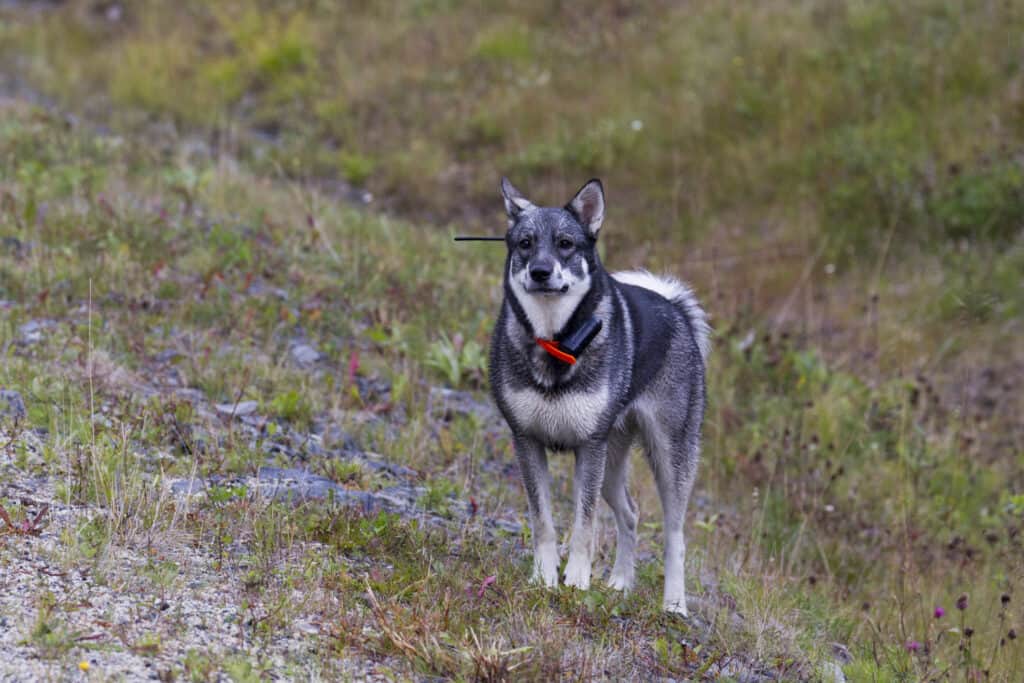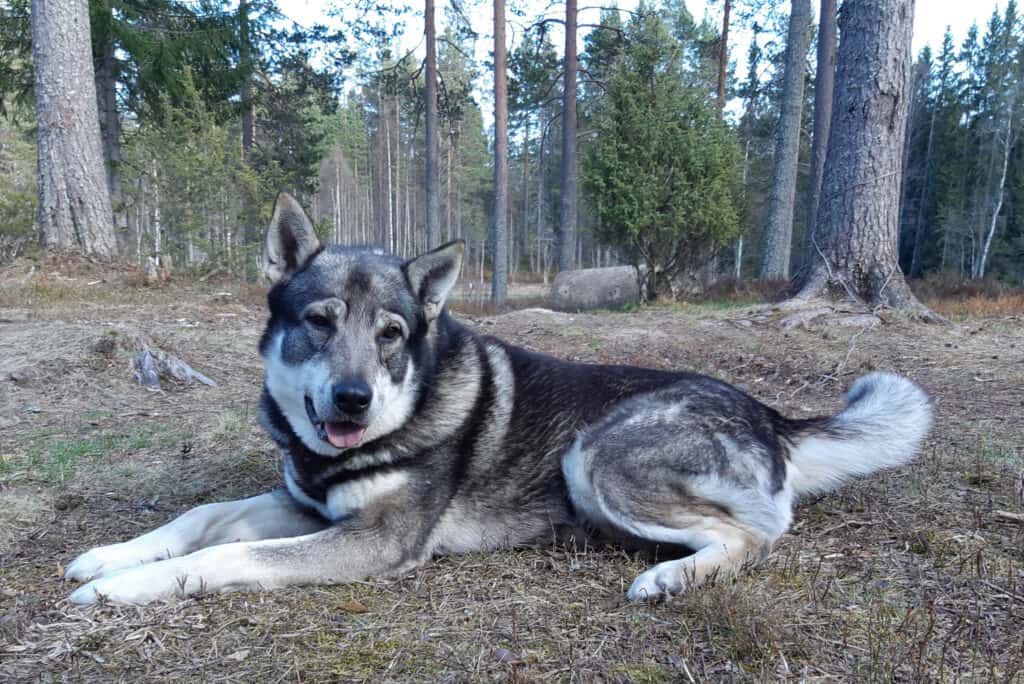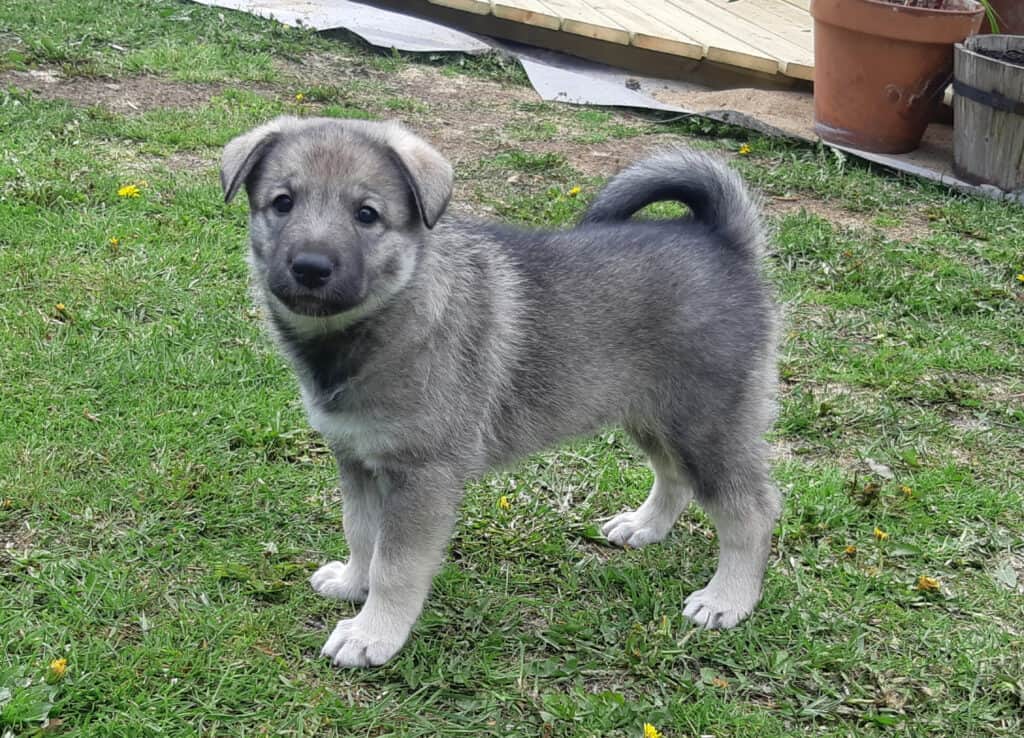Swedish Elkhound
Canis lupus familiaris
Swedish Elkhounds existed in prehistoric times!
Advertisement
Swedish Elkhound Facts
- Group Behavior
- Pack
- Fun Fact
- Swedish Elkhounds existed in prehistoric times!
- Temperament
- Swedish Elkhounds are outgoing and adventurous but can also be calm and laid back.
- Training
- This breed responds well to rewards-based training.
- Habitat
- Arctic climates
- Diet for this Fish
- Omnivore
- Lifestyle
- Pack
- Favorite Food
- Raw beef, chicken, duck, or turkey
- Common Name
- Swedish Elkhound or Jamthund
- Origin
- Jamtland, Sweden
- Location
- Canada, Sweden, Finland, Norway, and Russia
- Group
- Spitz
Swedish Elkhound Physical Characteristics
- Color
- Grey
- Light Grey
- Dark Grey
- Skin Type
- Fur
- Lifespan
- 12 to 14 years
- Height
- Male Swedish Elkhounds range between 22.45 and 25.59 inches in height, while females range between 20.47 and 23.62 inches in height.
- Aggression
- Low
Swedish Elkhound as a Pet:
- General Health
- Energy Level
- Shedability
- Trainability
- Intelligence
- Tendency to Chew
- Size
- Family and kid friendliness
- Yappiness / Barking
- Low
- Separation Anxiety
- Low
- Preferred Temperature
- Cold climate
- Exercise Needs
- Moderate
- Friendly With Other Dogs
- Poor
- Pure bred cost to own
- $1,000 to $2,000
- Dog group
- Hound
- Male weight
- 50-65 lbs
- Female weight
- 50-65 lbs
This post may contain affiliate links to our partners like Chewy, Amazon, and others. Purchasing through these helps us further the A-Z Animals mission to educate about the world's species.
View all of the Swedish Elkhound images!
“Swedish elkhounds have waterproof coats, which protect them from harsh, freezing winters.”
Swedish Elkhound Introduction
Did you know that Swedish elkhounds existed in prehistoric times? They originated in northern Sweden from a region called “Jamtland,” giving them their other common name: Jamthund. Originally, they were grouped with other breeds like Norwegian elkhounds, but in 1946, people acknowledged them as a separate breed. They navigate Arctic areas such as Canada, Russia, and Scandinavia, where they explore and hunt despite snow and uneven terrain. Although Swedish elkhounds enjoy bitterly cold climates, their warmth resides in their energetic and adventurous personalities. Although known as ambitious hunting dogs, they can also be both calm and friendly. In fact, the many facets of their personality make them the perfect companion.
See all of our expert product reviews.

The Swedish elkhound is a great family dog.
©iStock.com/pum_eva
Owning a Swedish Elkhound: 3 Pros and Cons
| Pros | Cons |
|---|---|
| Personable and great with children! Swedish elkhounds are a great family dog. Both loyal and playful, this breed has great success in a family setting. | Does not get along well with other dogs They often determine that other dogs are their competitors, so they may show aggressive behavior toward other breeds. |
| A hunting dog Because they’re a hunting breed by nature, they love adventure, hikes, and hunting trips. | Needs room for exercise This breed needs lots of space to run around, and they enjoy spending time outside. Spending excess time inside or only being allowed to exercise in a small yard is not appropriate for this breed. |
| Rarely needs a bath Bathing only needs to occur a few times a year, so hygienic maintenance required is relatively low. | Susceptible to several diseases Immunization and veterinary care for this breed is necessary because they are susceptible to health problems like heartworms or halitosis. |
The Best Dog Food for Swedish Elkhounds
The best meal plan for Swedish elkhounds is a raw diet comprised of fresh meat such as lamb, chicken, and turkey. Their acidic digestive system allows them to process raw meat quickly and utilize it as a source of energy. Grains should be avoided because they will be stored as fat. The addition of fish alongside other meats provides nutrients necessary for a healthy condition of coat, skin, and bones. A few root vegetables or berries may also be beneficial.
Though a raw diet is unarguably better than a commercial food diet, dry food with a high nutrient level is a viable option as well. Here is a selection of some of our favorite dog foods to help you decide. We recommend Taste of the Wild Pacific Stream Grain-Free Dry Dog Food. This dog food contains antioxidants and prebiotics, as well as omega fatty acids essential for healthy skin and coat.
At four weeks old, an elkhound can begin eating raw meat. They should start with raw hamburger. At eight weeks, they can begin to eat other boneless meats like chicken, beef, and some fish. Only small portions should be allowed at the beginning, starting with ground, ½ inch cubes of beef or chicken. After six months, they can eat chicken bones. Owners should grind any fish or other meats to avoid digestive problems. After about eight months, this large breed can devour practically any raw meat given to them, bone or no bone. They should be fed twice a day, but can be fed up to three or four times a day as growing pups.
Health and Entertainment for your Swedish Elkhound
See all of our expert product reviews.
•Nutritional, high protein food for large breed dogs
•Real protein as #1 ingredient
•Fruits & superfoods for vitamins & minerals
•Antioxidants, omega fatty acids, prebiotics
Swedish Elkhound Size and Weight
Males range between 22.45 and 25.59 inches in height, while females range between 20.47 and 23.62 inches in height. Both males and females can weigh between 50 and 65 pounds.
Swedish Elkhound Common Health Issues
They should be taken to the veterinarian once a year for tests and vaccination. Identifying health problems is crucial for avoiding common health risks. Checking the breath of this breed is important in identifying halitosis or periodontal disease, which are dental diseases that can cause infection and discomfort. This breed can also be susceptible to diabetes, liver or intestinal diseases, or kidney disease, which can all be identified by breath test. Be wary of heartworms in warmer climates, as mosquitoes can cause this ailment. A simple heartworm test from a veterinarian can help identify and mitigate the effects of heartworms. Finally, Swedish elkhounds can carry intestinal worms. In total, diseases that can affect the Swedish Elkhound are as follows:
- Halitosis
- Periodontal disease
- Diabetes
- Liver diseases
- Kidney disease
- Intestinal diseases
- Heartworms
- Intestinal worms
Swedish Elkhound Temperament and Behavior
Swedish elkhounds are known to be loyal and brave companions with exciting but also calm personalities. When well-trained, they are personable and get along well in family settings. They can play with children and adults alike. However, training this breed is crucial to its success. An untrained elkhound will engage in aggressive behavior. Another defining trait of this particular dog is its patience. It rarely becomes annoyed, making it both a fantastic hunter and family member. Due to their hunting nature, they behave intelligently and independently, too. Finally, they have an affectionate personality. With adequate training, there is no need to worry about traits of hostility in this breed.

With adequate training, this breed is patient and does not display hostile traits.
©iStock.com/Carina Danielsson
How to Take Care of Swedish Elkhounds
These hounds are moderate-maintenance dogs, meaning proper care is required for their success. Potential health problems require annual veterinary check-ups, and they may need medication in certain circumstances. They must follow a high-protein, no grain diet to be physically healthy and energized.
Swedish Elkhound Maintenance and Grooming
Regular brushing is important for this breed, as they can shed a good bit of hair. Brushing them every few days removes excess hair and decreases shedding. Bathing is only required a few times a year. Trimming matted fur beforehand is an efficient way to ensure a successful bath time.
Swedish Elkhound Training
Training from a young age is important in avoiding aggressive and stubborn behavior in later life. This breed is extremely intelligent, so they are easy to train and should be given rewards when they respond correctly to instruction.
Swedish Elkhound Exercise
Because they are a hunting breed, exercise is crucial to maintaining physical health. Their mental health also improves with regular exercise. They should exercise at least 30 minutes every day in an open space suitable for running and playing. A leash should be used on runs or hikes. Playing in the yard should be monitored when the Swedish elkhound is a puppy, and the addition of a fence should be considered.
Swedish Elkhound Puppies
When raising a puppy, proper feeding techniques should be followed (see The Best Dog Food for Swedish Elkhounds above). In addition, training as puppies is the best way to ensure obedience and loyalty later in life. Spaying and neutering is encouraged before six months of age. Immunization of puppies is also crucial to avoiding diseases like hepatitis or parvovirus. Consult a veterinarian about which vaccinations are needed in the first two months of life. Finally, Swedish elkhounds should start to engage in socialization programs at the eight or nine-week-old mark.

Specific vaccinations should be administered to puppies under two months old.
©iStock.com/Carina Danielsson
Swedish Elkhounds and Children
When trained, this breed gets along with children very well. They can be playful and calm, which complements energetic or relaxed children.
Dogs Similar to Swedish Elkhounds
Swedish elkhounds share similarities with other breeds such as the Norwegian elkhound, the Swedish vallhund, and the Finnish spitz.
- Norwegian elkhound – Norwegian and Swedish elkhounds are often confused as being the same breed because they are practically the same genetically. Both breeds are hunting dogs and respond well to reward-based training.
- Swedish vallhund – Like the Swedish elkhound, this breed is highly intelligent and easy to train. They also have a thick, water-resistant coat intended for cold weather.
- Finnish spitz – This dog originates from Scandinavia and is a hunting breed like the Swedish elkhound. Similarly, the Finnish spitz gets along well in family settings because of its playful and friendly personality.
Popular Names for Swedish Elkhounds
Some popular names for Swedish elkhound males are:
- Buddy
- Leo
- Diesel
- Cody
- Gus
Popular names for female Swedish elkhounds are:
- Roxie
- Layla
- Harley
- Luna
- Sadie
Related Animals
View all 293 animals that start with SSwedish Elkhound FAQs (Frequently Asked Questions)
How much does a Swedish elkhound cost to own?
Purchasing a Swedish elkhound can cost between $1,000 and $2,000. The annual cost of owning a Swedish elkhound is between $420 and $780, not including initial sterilization or cost of supplies like a leash or crate.
Is a Swedish elkhound good with kids?
Trained Swedish elkhounds are great with kids!
How long does a Swedish elkhound live?
Swedish elkhounds live between 12 and 14 years.
Are Swedish elkhounds prone to shedding?
This breed can shed a good amount of hair, but brushing a Swedish elkhound daily or every few days can decrease the possibility of shedding.
Thank you for reading! Have some feedback for us? Contact the AZ Animals editorial team.
Sources
- ITIS, Available here: https://www.itis.gov/servlett
- Kamia Kennels, Available here: https://www.kamiakennels.ca
- jamthund, Available here: https://sites.google.com/site/jaemthundswedishelkhound/standard-fci-en
- Wisdom Panel, Available here: https://www.wisdompanel.com/en-us/dog-breeds/swedish-elkhound
- Petlur, Available here: https://petlur.com/dog/breed/jaemthund


















